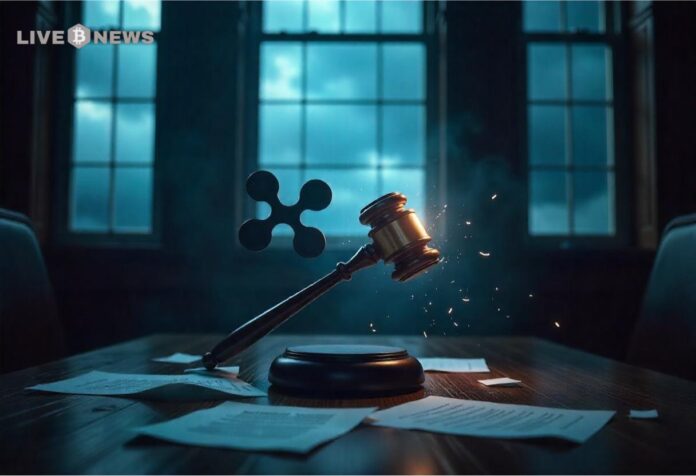.Key Insights:
- Judge Analisa Torres denied a joint request from Ripple and the SEC to reduce Ripple’s $125 million penalty.
- The judge pointed out that court judgments cannot be easily overturned by private settlement agreements.
- Ripple’s Chief Legal Officer, Stuart Alderoty pointed out that Ripple might appeal the ruling on institutional sales or withdraw its outstanding appeals.
Despite recent efforts by Ripple and the U.S. Securities and Exchange Commission (SEC) to end their years-long legal battle, a federal judge has just made a major ruling.
According to the latest updates, the $125 million penalty imposed on Ripple Labs will remain in place. In essence, even as the agency adopts a more crypto-friendly stance under new leadership, Ripple might have to pay the full penalty after all.
Let’s take a look at what happened, what it means for Ripple and how this ruling affects Ripple, the SEC and XRP’s investors.
Judge Torres Denies Joint Settlement Request
This ruling was passed on 26 June, where U.S. District Judge Analisa Torres denied the joint request from Ripple and the SEC. Within this request, both parties sought to reduce the initial $125 million civil penalty to $50 million and remove the permanent injunction against Ripple’s XRP sales.
#XRPCommunity #SECGov v. #Ripple #XRP BREAKING: Judge Torres has denied the parties’ Motion for an Indicative Ruling. pic.twitter.com/9AMhGcQUsU
— James K. Filan 🇺🇸🇮🇪 (@FilanLaw) June 26, 2025
However, the judge’s five-page decision came less than two weeks after the motion was filed, and showed that she had a firm stance on the matter.
Judge Torres made it clear that the law had not changed, and neither party had presented any good arguments to justify their joint motion. She pointed out that while the SEC may shift its regulatory tone, a final court judgment cannot be overturned simply because both parties now agree to settle on different terms.
“None of this has changed—and the parties hardly pretend that it has,” Torres wrote in her ruling. “Nevertheless, they now claim that it is in the public interest to cut the Civil Penalty by sixty percent and vacate the permanent injunction entered less than a year ago.”
The SEC vs. Ripple Lawsuit
The case between the SEC and Ripple dates back to 2020 when the SEC filed a lawsuit accusing Ripple Labs of illegally selling XRP as an unregistered security.
At the time, Gary Gensler’s SEC sought a $2 billion penalty, and claimed that Ripple’s institutional XRP sales violated federal securities laws.
However, Judge Torres handed out a partial win for Ripple. She ruled in 2023 that only the institutional sales of XRP counted as securities transactions, not the programmatic sales to retail investors.
This difference massively reduced Ripple’s liability. It led to the $125 million penalty, which was far less than the original $2 billion. Despite this, the ruling still came with a permanent injunction on Ripple’s institutional sales of XRP. Ripple has been trying to get it overturned for months.
Ripple’s Arguments Fall Flat
According to their joint filing, Ripple and the SEC requested a combined ruling from the court to reduce the penalty and lift the injunction. Both parties argued that this new ruling would serve the public interest. Moreover, it could show that the SEC was changing its stance against crypto.
However, Judge Torres dismissed the idea altogether. She stressed that any attempt to undo a court ruling must go through the formal appeals process. This, rather than being negotiated between parties after the fact.
With this, the ball is back in our court. The Court gave us two options: dismiss our appeal challenging the finding on historic institutional sales—or press forward with the appeal. Stay tuned. Either way, XRP’s legal status as not a security remains unchanged. In the meantime,… https://t.co/edHNbMzYbZ
— Stuart Alderoty (@s_alderoty) June 26, 2025
While the court denied Ripple and the SEC’s request, the ruling doesn’t change the legal classification of XRP itself.
Ripple’s Stuart Alderoty pointed out that XRP’s status as “not a security” in programmatic sales remains intact.
“The ball is back in our court,” Alderoty said. He also suggested that Ripple might pursue an appeal or consider ending the lawsuit altogether by withdrawing its outstanding appeals.
For investors, this means that the legal clarity around XRP hasn’t evaporated yet. Retail sales of XRP continue to fall outside the scope of securities laws, as defined by the 2023 ruling.
XRP Price Shows Resilience
Despite the setback in court, XRP’s market performance has been strong. At the time of the ruling, XRP was trading around $2.12, and was up 3.7% on the day.
The cryptocurrency is also up by over 347% in the past year. This impressive rally is largely due to the reduced legal uncertainty around crypto in general. The fresh optimism around crypto regulation under President Donald Trump’s administration also plays a part.
Interestingly, XRP is one of the few tokens in Trump’s proposed crypto reserve to maintain its post-election gains alongside ADA. In comparison, other major tokens, including Bitcoin and Ethereum, have struggled.





